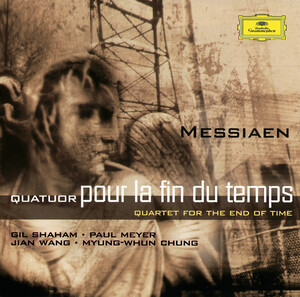 One of the most proclaimed chamber works of the last century, it is widely known that Olivier Messiaen's "Quartet for the End of Time" (for violin, clarinet, cello, and piano) was conceived and composed within the Nazi prison camp Stalag VIII A. Given this, and the fact that Messiaen was already at the forefront of musical exploration before his wartime captivity, one could reasonably presume the Quartet is heavy, discordant, and menacing. This is indeed the case at times, but it's impossible to summarize the whole piece so quickly and easily - Messiaen's fascination with bird songs, modal melodies, supernatural or "heavenly" harmonies, rhythmic augmentation and diminution, eternity, infinity, and Catholic mysticism is in full effect throughout the composition.
One of the most proclaimed chamber works of the last century, it is widely known that Olivier Messiaen's "Quartet for the End of Time" (for violin, clarinet, cello, and piano) was conceived and composed within the Nazi prison camp Stalag VIII A. Given this, and the fact that Messiaen was already at the forefront of musical exploration before his wartime captivity, one could reasonably presume the Quartet is heavy, discordant, and menacing. This is indeed the case at times, but it's impossible to summarize the whole piece so quickly and easily - Messiaen's fascination with bird songs, modal melodies, supernatural or "heavenly" harmonies, rhythmic augmentation and diminution, eternity, infinity, and Catholic mysticism is in full effect throughout the composition.Among our comrades was a clarinettist who was a member of the Orchestre National and who had been allowed to keep his clarinet. Messiaen started to write a piece for him while we were still in this field [where prisoners were held] as he was the only person there with an instrument. None of us had a violin or a cello or a piano. And so Messiaen wrote a piece for clarinet that was later to become the third movement of the Quatuor pour la fin du temps: Abîme des oiseaux (Abyss of the birds). Henri Akoka, the clarinettist, practised in the open field and I acted as his music stand. The piece seemed to him to be too difficult from a technical point of view and he complained about it to Messiaen. "You'll manage," was Messiaen's only reply.
Other highlights include the fiery, rhythmically complex sixth movement ("Dance of frenzy for the seven trumpets") and the heartbreaking eighth and final movement ("Eulogy to the Immortality of Jesus"), which according to Messiaen represents "the ascent of man towards his God, of the Child of God towards his Father, of the deified Being towards Paradise."
Each player on this recording is somewhat of a celebrity in the world of concert music, and followers of Giraffe Kingdom will already have a recording featuring Gil Shaham and Jian Wang paired together, namely on Brahms' "Double Concerto". Paul Meyer on the clarinet is as comfortable playing works by modernists like Penderecki and Berio as by giants of the Classical and Romantic eras. Rounding out the group, pianist Myung-Whun Chung is, like Shaham, a Deutsche Grammophon exclusive artist; no stranger to Messiaen's orchestral oevre, he is present on recordings of the Turangalîla Symphony, Éclairs sur l'au-delà (Illuminations on the Beyond), L'Ascension, and much more. This is his first recording of chamber work.
"This quartet is in eight movements. Why? Seven is the perfect number, the six days of Creation, sanctified by the Divine Sabbath; the seven of this rest is prolonged into eternity and becomes the eight of everlasting light, of eternal piece." - Olivier Messiaen
Download
Purchase
No comments:
Post a Comment